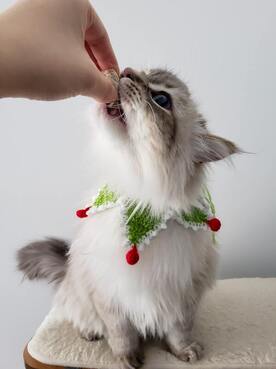Laurie Anne Walden, DVM Photo by Long Ma Photo by Long Ma The way we feed cats—not just the type of diet we choose—can affect their physical and mental health. Animals are happiest and healthiest when they’re able to do all of the things that are normal for their species. For cats, normal feeding behavior is related to their nature as hunters. Almost all cat species are solitary hunters, unlike wolves and other canines that hunt in packs. (Lions are the exception.) Domestic cats have not evolved far from their wild relatives in this respect. This means that pet cats usually like to eat several small meals a day alone, according to the American Association of Feline Practitioners (AAFP). The following suggestions are from the 2018 AAFP consensus statement on feline feeding programs.[1] Potential Health Problems Related to Feeding Methods Some common feeding methods can cause physical and emotional problems for pet cats, says the AAFP. Feeding 1 or 2 large meals a day in a single location contributes to inactivity and weight gain, increasing the risk for medical problems like diabetes. Eliminating the need to hunt reduces a cat’s activity level and mental stimulation. And feeding cats in a group might lead to food-related conflict and stress, which in cats is linked to bladder and behavior problems. Suggestions for Feeding Cats
Suggestions for Multiple Cats
References 1. Sadek T, Hamper B, Horwitz D, Rodan I, Rowe E, Sundahl E. Feline feeding programs: addressing behavioral needs to improve feline health and wellbeing. J Feline Med Surg. 2018;20(11):1049-1055. doi:10.1177/1098612X18791877 2. Delgado MM, Han BSG, Bain MJ. Domestic cats (Felis catus) prefer freely available food over food that requires effort. Anim Cogn. Published online July 26, 2021. doi:10.1007/s10071-021-01530-3 Photo by Long Ma on Unsplash Comments are closed.
|
AuthorLaurie Anne Walden, DVM Categories
All
Archives
June 2024
The contents of this blog are for information only and should not substitute for advice from a veterinarian who has examined the animal. All blog content is copyrighted by Mallard Creek Animal Hospital and may not be copied, reproduced, transmitted, or distributed without permission.
|
- Home
- About
- Our Services
- Our Team
-
Client Education Center
- AKC: Spaying and Neutering your Puppy
- Animal Poison Control
- ASPCA Poisonous Plants
- AVMA: Spaying and Neutering your pet
- Biting Puppies
- Boarding Your Dog
- Caring for the Senior Cat
- Cats and Claws
- FDA warning - Bone treats
- Force Free Alliance of Charlotte Trainers
- Getting your Cat to the Vet - AAFP
- Holiday Hazards
- How To Feed Cats for Good Health
- How to Get the Most Out of your Annual Exam
- Indoor Cat Initiative - OSU
- Introducing Your Dog to Your Baby
- Moving Your Cat to a New Home
- Muzzle Training
- Osteoarthritis Checklist for Cats
- What To Do When You Find a Stray
- Our Online Store
- Dr. Walden's Blog
- Client Center
- Contact
- Cat Enrichment Month 2024
|
Office Hours
Monday through Friday 7:30 am to 6:00 pm
|
Mallard Creek Animal Hospital
2110 Ben Craig Dr. Suite 100
|
Site powered by Weebly. Managed by IDEXX Laboratories

 RSS Feed
RSS Feed